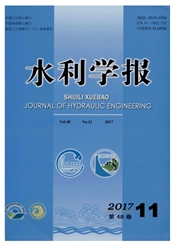

 中文摘要:
中文摘要:
对于天然淡水冰而言,冰温是决定其性质的关键因素。基于对黑龙江红旗泡水库淡水冰现场实测冰温、辐射等数据的分析,利用冰温数据探讨天然淡水冰热扩散系数受冰温度的影响情况。借鉴文献中淡水冰热传导系数、比热和密度等的研究成果,通过建立最优控制模型的方法,从数学角度上说明了水库天然淡水冰温度对热扩散系数的影响:在相对高冰温区域热扩散系数变化显著,随冰温升高明显降低,并趋于水的热扩散系数值;在相对低冰温区域热扩散系数变化缓慢,随冰温降低逐渐趋于稳定。所证明的高温区域热扩散系数的剧烈变化趋势的存在性为天然淡水冰热扩散系数与淡水热扩散系数之间的过渡赋予了较为合理的物理解释。最后,对辨识的天然水库淡水冰热扩散系数的变化做了简单讨论。
 英文摘要:
英文摘要:
For the natural freshwater ice, ice temperature is a key factor influencing its properties. Based on the analysis of the in-situ observations, e.g. ice temperature, radiation, from the Hongqipao Reservoir in Heilongjiang province, the effect of ice temperature of natural freshwater ice on the thermal diffusivity is examined by using the measured ice temperature data. According to the previous research on the thermal conductivity of freshwater ice, the specific heat capacity and density, the influence of ice temperature of freshwater ice on the thermal diffusivity is illustrated mathematically by establishing an optimal control mod- el. At higher ice temperatures, the thermal diffusivity changes rapidly. It decreases with the increase of ice temperature significantly, and tends to reach the value of thermal diffusivity of fresh water. At lower ice temperatures, the thermal diffusivity changes slowly and tends towards stability with the decreasing ice tem- perature. The existence of the dramatic change at higher ice temperatures is proved, which could provide a reasonable explanation for the transition of the thermal diffusivity from fresh water to freshwater ice. Final- ly, the preliminary results about the thermal diffusivity of natural freshwater ice obtained in this paper are discussed briefly.
 同期刊论文项目
同期刊论文项目
 同项目期刊论文
同项目期刊论文
 期刊信息
期刊信息
